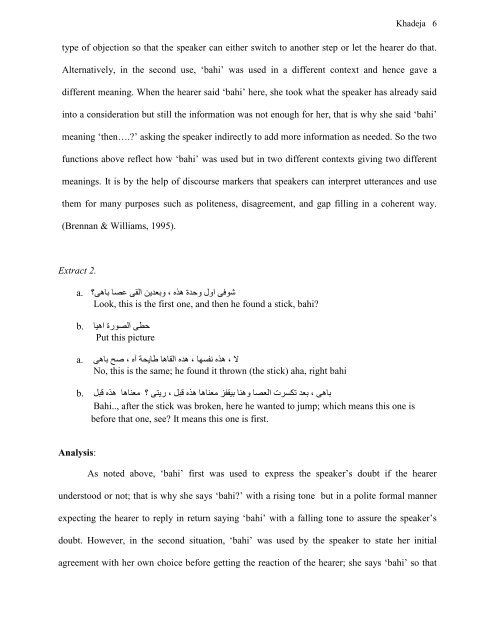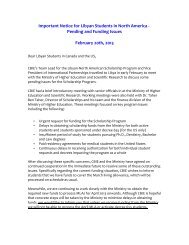Bahi-as-a -Discourse -Marker-in-Daily -Libyan-Arabic
Bahi-as-a -Discourse -Marker-in-Daily -Libyan-Arabic
Bahi-as-a -Discourse -Marker-in-Daily -Libyan-Arabic
Create successful ePaper yourself
Turn your PDF publications into a flip-book with our unique Google optimized e-Paper software.
Khadeja 6type of objection so that the speaker can either switch to another step or let the hearer do that.Alternatively, <strong>in</strong> the second use, ‘bahi’ w<strong>as</strong> used <strong>in</strong> a different context and hence gave adifferent mean<strong>in</strong>g. When the hearer said ‘bahi’ here, she took what the speaker h<strong>as</strong> already said<strong>in</strong>to a consideration but still the <strong>in</strong>formation w<strong>as</strong> not enough for her, that is why she said ‘bahi’mean<strong>in</strong>g ‘then….?’ <strong>as</strong>k<strong>in</strong>g the speaker <strong>in</strong>directly to add more <strong>in</strong>formation <strong>as</strong> needed. So the twofunctions above reflect how ‘bahi’ w<strong>as</strong> used but <strong>in</strong> two different contexts giv<strong>in</strong>g two differentmean<strong>in</strong>gs. It is by the help of discourse markers that speakers can <strong>in</strong>terpret utterances and usethem for many purposes such <strong>as</strong> politeness, disagreement, and gap fill<strong>in</strong>g <strong>in</strong> a coherent way.(Brennan & Williams, 1995).Extract 2.شوفى اول وحدة هذه ، وبعدين القى عصا باه ى؟ .aLook, this is the first one, and then he found a stick, bahi?حطى الصورة اهيا .bPut this pictureلا ، هذه نفسها ، هده القاها طايحة آه ، صح باهى .aNo, this is the same; he found it thrown (the stick) aha, right bahiباهى ، بعد تكسرت العصا وهنا بيقفز معناها هذه قبل ، ريتى ؟ معناها هذه قبل .b<strong>Bahi</strong>.., after the stick w<strong>as</strong> broken, here he wanted to jump; which means this one isbefore that one, see? It means this one is first.Analysis:As noted above, ‘bahi’ first w<strong>as</strong> used to express the speaker’s doubt if the hearerunderstood or not; that is why she says ‘bahi?’ with a ris<strong>in</strong>g tone but <strong>in</strong> a polite formal mannerexpect<strong>in</strong>g the hearer to reply <strong>in</strong> return say<strong>in</strong>g ‘bahi’ with a fall<strong>in</strong>g tone to <strong>as</strong>sure the speaker’sdoubt. However, <strong>in</strong> the second situation, ‘bahi’ w<strong>as</strong> used by the speaker to state her <strong>in</strong>itialagreement with her own choice before gett<strong>in</strong>g the reaction of the hearer; she says ‘bahi’ so that
















